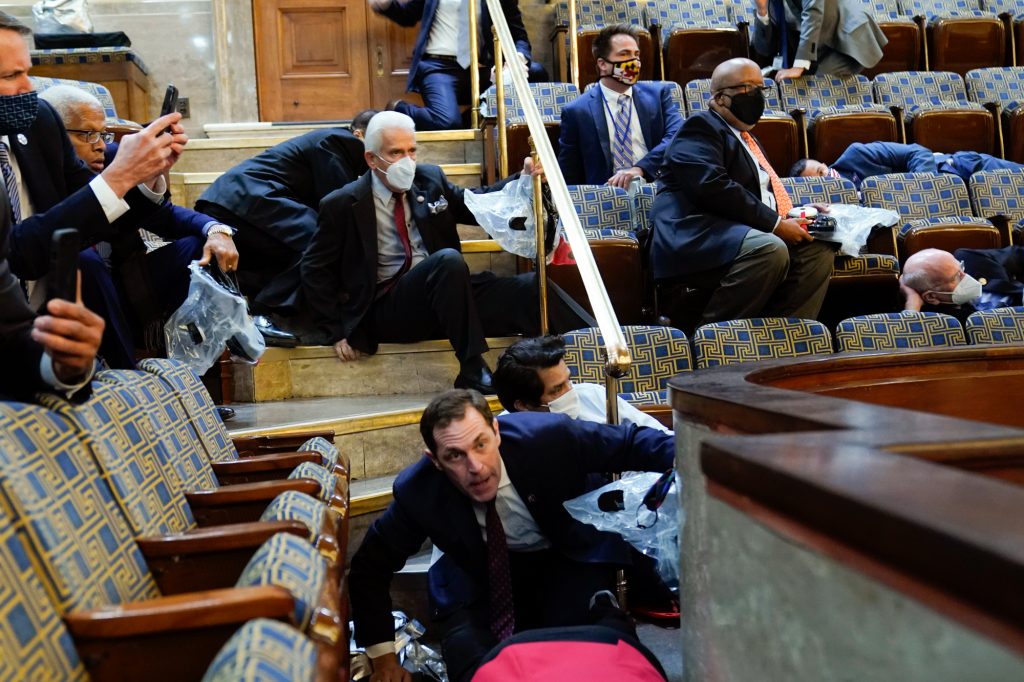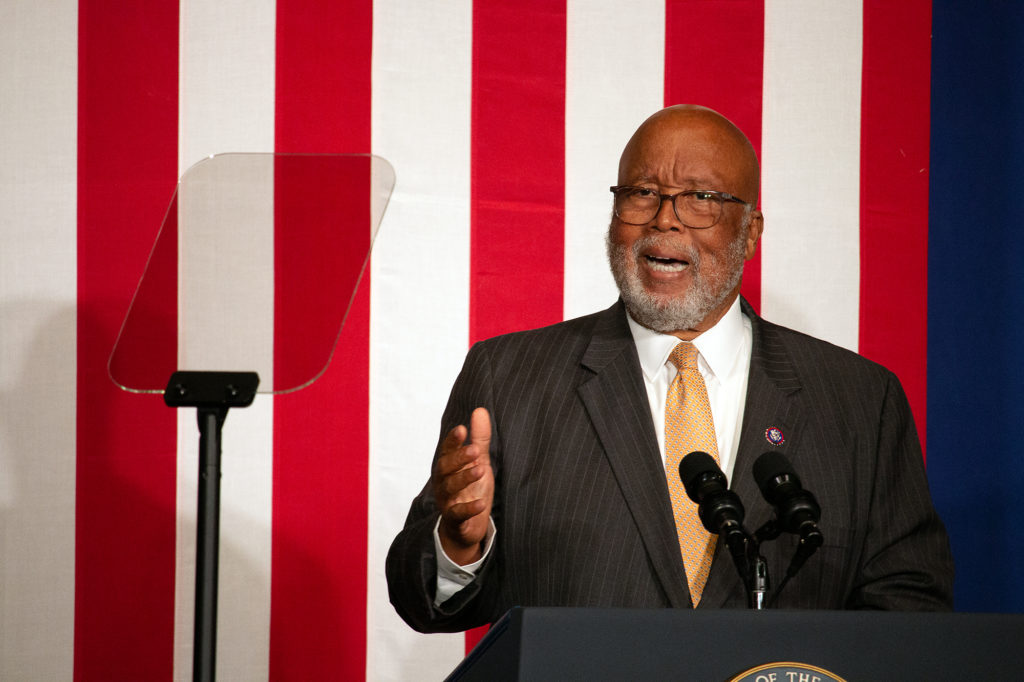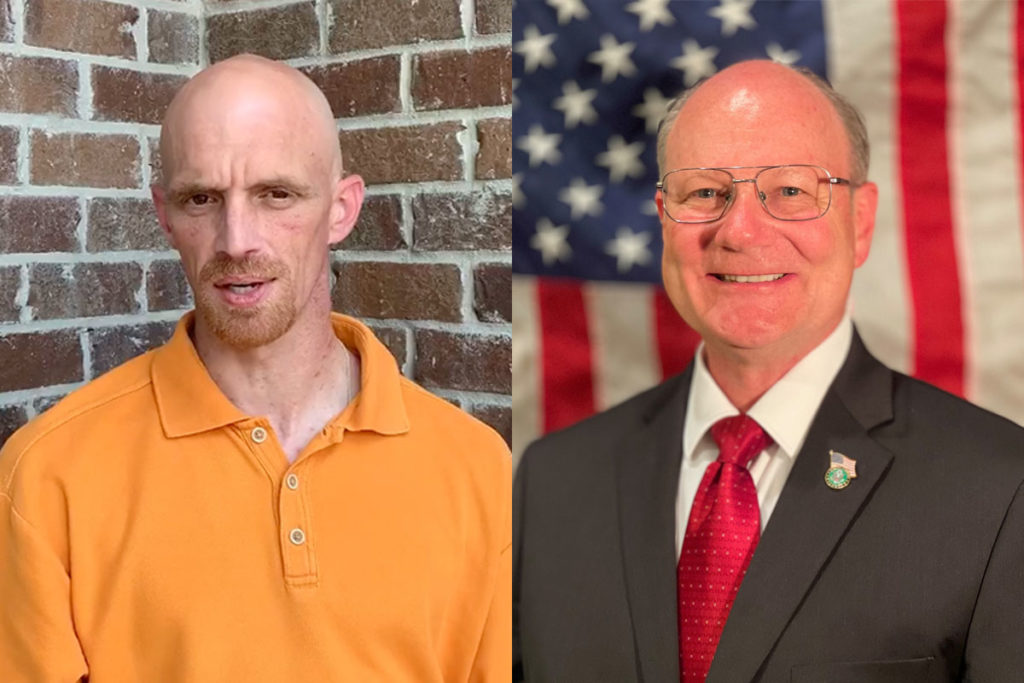Two Republicans will go head-to-head for their party’s nomination in Mississippi’s 2nd congressional district after placing first and second in the June 7 primary. The candidates, Brian Flowers and Ron Eller, are vying for the chance to challenge incumbent Democratic U.S. House Rep. Bennie Thompson in November.
Flowers won 43% of the vote in the June 7 primaries, while Eller won about 33%. A candidate would have needed to win 50% or more of all votes to have claimed the nomination outright without going to a runoff on June 28.
“I’m grateful for the faith and support that you all have in me,” Flowers wrote in a message to his supporters on Facebook Wednesday, adding that “we cannot afford to have a low turnout.” Eller similarly thanked his supporters in a Facebook post, along with his wife and “the other candidates for stepping up to stand for Mississippi.”
Flowers, a North Carolina native and Navy veteran, previously won the Republican nomination in 2020, but lost to Thompson 66% to 34%. His website describes him as “a proponent of true Constitutional government of the sort that made America great.”
Eller is also a military veteran who first joined the Army as a combat medic and served for 20 years. After retiring from the military, he and his wife, Doris, moved to Mississippi. He now works as a physician assistant in cardiac and thoracic surgery at St. Dominic’s Hospital in Jackson. He is the CEO of Buck Warrior Enterprises, LLC, a business he founded in 2013.
Eller says on his website that he “feels called to continue to stand by the oath he took to support and defend the Constitution of the United States against all enemies foreign and domestic.”
Thompson, who leads the U.S. House on Homeland Security, is Mississippi’s only Black or Democratic representative. He defeated Democratic opponent Jerry Kerner by about 96% to 4% in the June 7 party primary. The two remaining Republicans are both running on conservative platforms, though their platforms differ in the details.
Education and ‘State Sovereignty’
In a candidate questionnaire Ron Eller filled out for the Mississippi Free Press, he said he believes “funding needs to follow the student.”
“Charter Schools and school choice should be allowed,” he said. “I believe schools should be treated like a business, if a particular school has a good product and students/family want to get their education from there, so be it. By the same thought if a particular school is failing then those students and families should be allowed to opt out. We need to teach children about the greatness of America. Additionally we need to teach life skills.”

Flowers did not respond to MFP’s questionnaire, but says on the issues section of his website that he wants “move control of education to the State and local level” and “work to restore State sovereignty.”
“My election to Congress will strengthen the effort to eliminate Marxist influences that have been using the federal government (and State government, too) for decades to achieve total control over education and your children. Most people now clearly see the tragic results,” his website says.
Flowers’ website does not specify which “Marxist influences” he is referring to, nor what the alleged “tragic results” are, but right-wing politicians throughout Mississippi history have long made the claim that “Marxism” or “communism” was running rampant in public schools. Such charges date back to the time when segregationist Democrats, known as Dixiecrats, ran the state with explicitly white-supremacist policies.
In modern times, claims of “Marxism” in education have cropped up in arguments over so-called “critical race theory.” Despite the fact that Mississippi K-12 schools do not teach critical race theory, an intellectual and legal framework taught in some college and law school courses, state Republicans this year passed a bill that they incorrectly claimed bans it in K-12 schools and community colleges. The law does not ban schools from teaching critical race theory, but its opponents fear it risks causing confusion and chilling educational speech.
On his site, Flowers claims that the U.S. Constitution offers a roadmap to “the kind of greatness that God and good people can embrace” in education. He wants to “gradually eliminate federal control of education” and end the use of federal dollars for education in order to fund it using only state and local dollars.
“We cannot take federal money for our schools and at the same time expect the feds to allow local people to be in control, which is where we need to be,” Flowers says on his site. “When education is locally controlled and supported, Marxist and other groups with evil or just plain stupid ideas will have to sell their programs to you and your friends. That’s where they will … lose and our children win.”
A 2021 PEER report found that Mississippi spends less per pupil than any of its surrounding states, including Alabama, Arkansas, Louisiana and Tennessee. Between fiscal-year 2016 and fiscal-year 2020, about 51% of education funds came from the state, 35% from local sources and 14% from federal assistance. In poorer parts of the state and areas with larger Black populations, though, schools are often significantly underfunded.
Flowers’ arguments for “state sovereignty” extend beyond education; he claims there is a “hierarchy of power in the American republic”: “1. God, the Creator”; “2. Individuals, created in the image of God”; “3. Sovereign, individual States and local governments”; “4. The federal government.”
“Has any candidate other than Brian brought these facts to your attention? It’s doubtful,” Flowers’ website says, explaining that “the other candidates are either ignorant or criminals.”
State sovereignty is a term with deep historic resonance in Mississippi. Supports of slavery used the concept to argue that states had a “right” to continue the institution of slavery regardlesss of what the federal government said. Later, during the Jim Crow-era, segregationists invoked “state sovereignty” to argue against integrating public spaces, including schools and universities, and to oppose voting rights legislation. In a phone call after this story published, Flowers said he believes the Civil Rights Act and the Voting Rights Act were necessary at the time of their enactment and did not violate state sovereignty.
‘Election Integrity’ and January 6th
Ron Eller’s website describes him as a proponent of “election integrity,” a vague phrase that has become increasingly common as Republicans nationwide have responded to former President Donald Trump’s unsubstantiated claims of voter fraud.
“Photo ID (State/Government) issued is the gold standard,” Eller said in the MFP questionnaire, referring to Mississippi’s voter ID requirements. “In addition there should (be) a required signature match. Any use of electronic voting machines should produce a paper receipt/copy. The government should retain said paper copy, as well as a copy provided to the individual.”

On his website, Eller says he opposes same-day voter registration, a system that allows voters in 21 states and the District of Columbia to register to vote and cast a ballot on the same day as an election. Mississippi law requires voters to register at least 30 days before an election takes place in order to vote.
Brian Flowers similarly describes himself as a proponent of “election integrity” on his campaign site.
“Even if you think the 2020 federal election was handled honestly, what harm could be done by ensuring that only genuine citizens vote once as their conscience dictates or not at all,” Flowers says. “ Does anyone have the God-given right to vote for another person? Of course not, because that amounts to two votes cast by the same person. There is no way to justify fraud–period–but liars, criminals, and tyrants need no justification for anything except their own personal ambitions.”
Flowers’ website says “the people of the States must work to ensure that their elections processes are honest,” but does not provide specifics for how such goals should be achieved. In a blog post, the candidate repeats uncorroborated claims that the 2020 election results were “suspect” and praises the Trump supporters who amassed on and violently stormed the U.S. Capitol on January 6, 2021 as protestors who wanted “to make their displeasure known and their voices heard.”
“They were there to defend the Republican and the democratic system. The media called these patriots ‘insurrectionists,’” Flowers’ site says. “In reality, it was the Democratic Party who conducted an insurrection. The Democrats arranged a successful takeover of the federal government, and anyone who questioned their methods and the fairness of the election was accused of insurrection.”
Rep. Bennie Thompson is the chairman of the U.S. House Select Committee on January 6th, which Flowers claims “is trying to intimidate American patriots by persecuting hundreds of protestors that are being held as political prisoners since approximately January 6, 2021.” Thompson, Flowers claims, has “evil ideas” and “believes in using his chairman position to give his party a stranglehold on American politics.”
Investigations into the 2021 insurrection are ongoing in the U.S. Department of Justice, where officials have arrested more than 840 people in connection with the attacks in all 50 states. DOJ says 305 individuals have pleaded guilty to a variety of federal charges, and courts have found six individuals guilty at trial.
“I’m from a part of the country where people justified the actions of slavery, the Ku Klux Klan, and lynching,” Thompson said during a January 6th hearing last week. “I’m reminded of that dark history as I hear voices today try to justify the actions of the insurrectionists on January 6, 2021.”
Infrastructure and Energy
In the MFP questionnaire, Ron Eller said that while “much of America is the envy of the world,” some areas “have fallen behind the rest such as the Mississippi Delta and Appalachian Mountain regions.”
“These areas need increased economic development and growth in order to improve the infrastructure,” he said.

Asked about his views on the environment and climate change, the candidate insisted that “we need to use all of our resources.”
“Energy is the life blood of the American Economy and a national security issue,” Eller said. “Eventually, a clean form of renewable energy will win out. But until that day we should not hamstring the American People and Economy for what at this time is a pie in the sky dream.”
While Eller wants more investment in infrastructure, Brian Flowers says on his website that he believes “the Constitution prohibits infrastructure spending by the federal government.”
“In fact, when polled, most voters believe that spending money on infrastructure is precisely what Congress should be doing, but there are many good reasons why infrastructure spending is reserved to the States,” Flowers’ site says. “For one, why should taxpayers in Mississippi pay for a road project in New York, or vice versa? For another, it’s better for State to handle such matters since its needs and expenses can be tailored for that individual State.”
He vows to “work to repeal un-Constitutional federal programs, reduce taxes, stop inflation, and return power to the States.”
Mississippi has long struggled to maintain its infrastructure, with crumbling roads and bridges posing constant issues. Throughout the state, local water systems are in disrepair, including in the capital city of Jackson, where residents went without clean running water for a month in 2021.
The State is, however, receiving billions in funding for infrastructure repairs from President Joe Biden’s Infrastructure Investment and Jobs Act, including $75 million from water repairs (city leaders have estimated that repairing Jackson’s water system alone, however, could cost $1 billion). Rep. Thompson is the only Mississippi congressman who voted for the bill.
Economy and Inflation
Ron Eller said in his response to MFP’s questionnaire that he wants economic policies “based on an America First free market system.”
“We should not rely on other nations for items needed for national security,” Eller said. “Such items includes electronics, medications, energy, and etc…. If a company moves its business, banking, etc… off shore then we need to look at making this costly decision. We need to reduce the cost of doing business by lowering taxes and reducing regulation.”
On his site, Brian Flowers says he wants to fight inflation by promoting “constitutional economic stability,” though he does not provide many specifics.
“The greatest cause of inflation is the enormous cost of un-Constitutional federal programs,” the site says. “As Patriotic Congressmen, with the support of the American people, gradually return the federal government to its true constitutional limits, inflation will diminish, the buying power of your dollars will be protected, and the economy will stabilize.”
You can read more about Eller’s views on other issues—like federal marijuana laws, LGBTQ rights, criminal justice and more—on the MFP questionnaire. Flowers has not yet responded to MFP’s questionnaire.
Vote on June 28
All Mississippi primary runoffs are on June 28, 2022. Voters in the 2nd Congressional District are eligible to cast a ballot if they registered to vote by May 31. There is no party registration in Mississippi and voters are eligible to vote in the GOP primary runoff even if they did not vote in the June 7 primaries. However, those who voted in the Democratic primary cannot vote in the GOP runoff.
When they arrive at the polls on June 7, voters must bring an acceptable form of photo identification, such as a driver’s license, state-issued photo ID, U.S. passport, government employee ID card, student ID from a state university or college, firearms license, tribal ID or a Mississippi Voter Identification Card. Information on how residents can obtain a free voter identification card from their local circuit clerk’s office is available here.

Secretary of State Michael Watson has urged voters to verify their vote registration is active by checking online at this link. More information on voting is available on the Secretary of State’s FAQ section and Voter Information Guide.
The winner of the 2nd Congressional District GOP runoff will face Rep. Bennie Thompson in the general election on Nov. 8, 2022.










